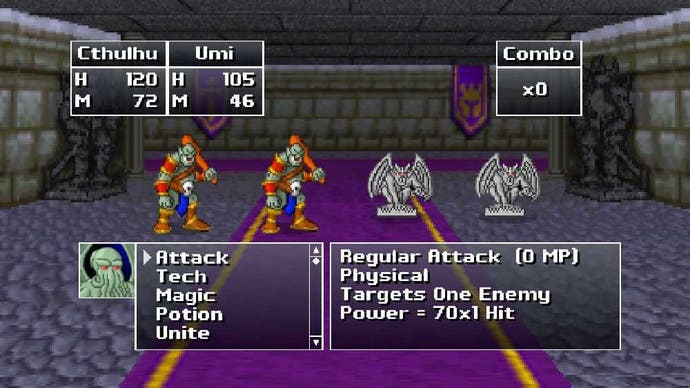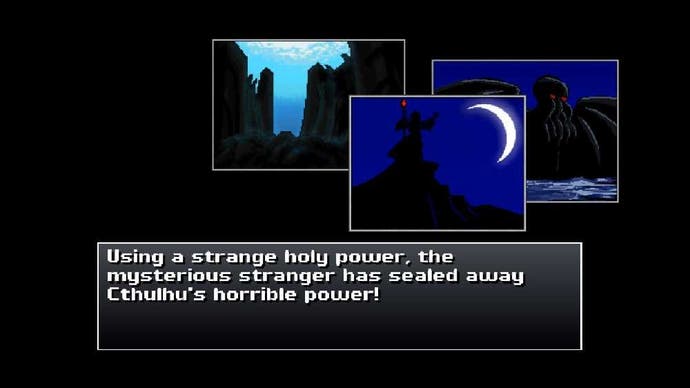Cthulhu Saves The World
Old gods, new tricks.
The depth carries across to the combat system, which also walks the tactical tightrope with quiet confidence. Health is restored after each victory but magic points are not. The quicker you beat each battle the more MP is restored, but this generally means using up MP to deliver your strongest attacks. Enemies also get stronger by 10 per cent with each round, giving you another reason to win as quickly as possible.
Playing off against this is a combo system which sees you racking up points for every hit against an enemy. The combo score can then be cashed in by using extra-strong attacks that can deal thousands in damage, but require careful resource management to build up.
As ingenious and satisfying as this tug of war can be, it can also become a hindrance. If the game has inherited one of its forebears worst traits without improvement it's the often infuriating navigation. With no map, and sprawling dungeons made up of identical features repeated over and over, it's easy to spend too much time trudging up and down baffling corridors, trying to work out which way you need to go. The random encounters stack up, the MP goes inexorably down and irritation starts to seep in.

Such annoyances are fleeting, however, and the delicious silliness of the cutscenes and characters helps to wash the taste away. You don't need to be a fan of Lovecraft or JRPGs to enjoy the humour, though it certainly helps. An enemy called Beltman, made entirely of belts, is funny enough as it is even if you're not aware of Square's fondness for draping its characters in straps and buckles.
Most of the genre in-jokes are less esoteric - such as the priest who asks Cthulhu if he's come to pray for salvation, only to be told, "No, I just like walking around villages talking to everybody. Force of habit."
What makes Cthulhu Saves The World all the more impressive is that it's an Indie game. The prevalence of half-arsed rubbish on that channel means that it's hard not to feel a little patronising when something truly great comes along, as if we're patting a small child on the head and saying "Well done! You made a real game!"

This is a real game. It doesn't have the longevity of the titles that inspired it, setting a blistering pace that allows you to hammer through chapters at a fair old lick if you're not bothered about finding every last loot chest along the way. But even in this truncated form you can expect to experience a good seven to eight hours of challenging combat and endearingly daft story.
There's also a Score Attack mode and Highlander mode, which restricts you to just Cthulhu in battle, showing that smaller games can boast big rewards.
For 240 MS Points (just a shade over £2.00) it's pricier than most of its Indie peers. But Cthulhu Saves The World also justifies that investment by being more fun than a lot of 1200 Point Arcade games. At this price, you'd be a gibbering madman not to give it a go.








